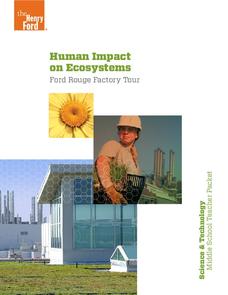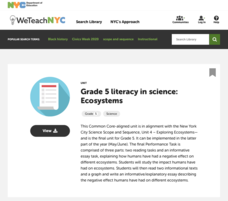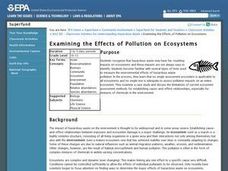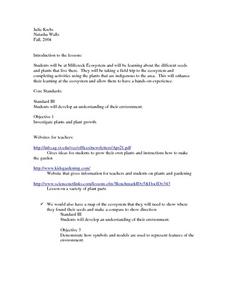Curated OER
Designing a Real Life Ecosystem!
Students research abiotic and biotic factors concerning the concept of an ecosystem. Record and analyze data collected. Write a lab report in proper and scientific format with thinking and analytical skills. Work as a cooperative team.
Curated OER
Using Environmental Models to Determine the Effect of Acid Rain on an Ecosystem
Demonstrate to your middle school science learners how chalk breaks down in a weak acid. Discuss what affects acidic rain might have on ecosystems. Lab groups then choose one of two questions: "How does acid precipitation affect an...
Purdue University
Mammals and Ecosystems
Mammals have unique interactions with their ecosystems. Using a multi-part lesson, learners research local mammals using recommended websites and use their findings to create their own paper ecosystems including appropriate mammals. They...
NOAA
Build Your Own Ocean Ecosystem
Hold the sea in the palm of your hand! Amateur oceanographers work together to create models of an ocean ecosystem in the sixth and final installment in a series. Raise awareness of global ocean health issues through guided research,...
Henry Ford Museum
Human Impact on Ecosystems
An environmenta science unit includes three lessons plus a cumulative project covering the ecosystem. Scholars follow the history of the Ford Rouge Factory from its construction on wetlands and how it destroyed the environment to its...
New York City Department of Education
Grade 5 Literacy in Science: Ecosytems
How do humans affect ecosystems? Learners read two articles and interpret a graph to develop essays on the human impact on ecosystems. They read about human impact on tigers and manatees as a basis for their overarching papers.
Virginia Department of Education
Ecosystem Dynamics
Searching for an eccentric way to enhance lessons on ecosystems while ensuring pupils remain creative and motivated? Upon viewing The Lorax by Dr. Seuss, designated groups design and construct a pop-up book that depicts the specific ways...
Curated OER
Models as Tools for Ecosystem Management
Fifth graders explore the concept of environmental management. In this ecosystem lesson, 5th graders discover how models help scientists learn more about managing ecosystems. Students create their own model, make observations and...
Curated OER
Food Webs and Making Miniature Ecosystems
Students model a food web and create a miniature ecosystem. In this animal interactions lesson, students engage in a role playing game which simulates a food web. Students then build miniature ecosystems using pop bottles, snails, plants...
Curated OER
Modeling changes to Ecosystems Part 1
Students record changes in an ecosystem. In this science instructional activity students make a hypothesis about changes in a terrarium. They record their observations. The students conduct an experiment to test their hypothesis.
Howard Hughes Medical Institute
Modeling Trophic Cascades
In the ecological game of who eats who, one small change can have a big impact! Individuals create food chains in an array of ecosystems, then determine what happens to organisms in the chain when one organism changes its feeding...
Terminix
The Pollinator
What do bees and children have in common? They both love their sweets. Decorate a flower pot or bucket to look like a brightly colored flower and fill it with wrapped candy and cheese puffs. Have learners reach into grab the candy,...
Curated OER
Carrying Capacity
Young biologists identify how plants and animals are affected by changes in their ecosystem and environment. The concepts of succession, maintenance of habitats, interrelationships, and adaptation are all discussed. This well-developed...
Kentucky School for the Deaf
Levels of Organization within an Ecosystem
From tiny organisms to entire biomes, young scientists examine the interdependent relationships tying all living and non-living things together with this collection of ecology resources.
Curated OER
The Marvels of Mud
Young scientists roll up their sleeves and get a little dirty in this three-day earth science investigation. Following the scientific method, children monitor the growth of algae in pond water samples in order to determine the role that...
Curated OER
Examining the Effects of Pollution on Ecosystems
Students examine the different types of tests used to measure the environmental effects of hazardous waste. They work together to determine the impact of pollution on different ecosystems. They read a case study and answer questions to...
Curated OER
Ecosystem Field Trip
Young scholars investigate the different seeds and plants that are part of the Millcreek ecosystem. They take a field trip to the ecosystem and complete activities using the plants that are indigenous to the area.
Purdue University
Eco-llapse
A balanced ecosystem doesn't mean balanced populations. Budding scientists complete a series of activities to learn about the relationship between producers and consumers in an ecosystem. They complete the wildlife conservation...
Virginia Department of Education
Building a DNA Model
It has been decades since the discovery of DNA. Still, activities such building this DNA model allow blossoming scientists to better understand the components that form this overall structure. During this activity, they will also...
Curated OER
What Makes up an Ecosystem?
Eighth graders design posters of working ecosystems using pictures from magazines. They label autotrophic, heterotropic, or saprotrophic energy sources, and identify predators and prey.
Howard Hughes Medical Institute
Population Dynamics
Will human population growth always be exponential, or will we find a limiting factor we can't avoid? Young scientists learn about both exponential and logistic growth models in various animal populations. They use case studies to...
Consortium for Ocean Science Exploration and Engagement (COSEE)
Plankton to Penguins: Antarctic Food Web
A well-written lesson plan, second in a series of four, gets high schoolers exploring how the Antarctic food web is impacted by climate change and the associated melting of polar ice sheets. It begins with a PowerPoint presentation about...
Chicago Botanic Garden
Nature Walk and Ecosystem Introduction
A food web has no organism higher than a tertiary consumer because there wouldn't be enough energy left to sustain them. The fourth installment in a seven-part series begins with a nature walk to get pupils thinking about their...
Curated OER
Biomes and Plant Growth
Seventh graders design four biomes models and plant three types of seeds in them to observe growth. In groups for each type of biome, they predict the seeds' growth in each of the settings. Students follow the conditions on a biome chart...

























